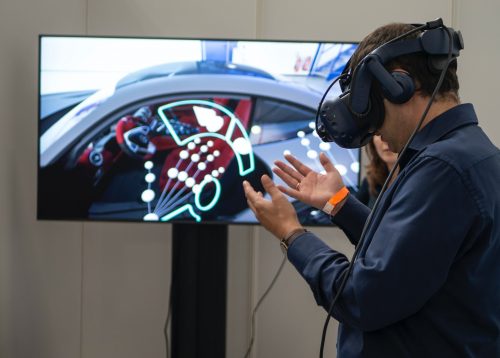
Changes in technology have always driven change in the world of business. However, never before in history has tech change happened so fast as in the last two decades. Just think back a few years to a world without the internet, the PC, and the mobile phone and you’ll get an idea of how quickly things have moved forward! The pace of tech advances is only going to get faster, and one of the major developments for business over the next few years is set to be virtual reality (VR) and augmented reality (AR). While you might think VR and AR are something to play video games on, over the coming years they are going to become indispensable in businesses across the globe.
What is VR and AR?
VR technology creates a completely immersive, computer-generated environment. Users interact with that environment via devices such as VR glasses. Meanwhile, AR tech embraces the real world, adding a layer of the digital world, for example, 3D effects. With the global VR and AR market revenues slated to grow by $125 billion from 2020 to 2024, these emerging technologies are going to revolutionize business as we know it. Here are just 4 of the many industries which will be impacted.
Healthcare
VR and AR technologies are going to play in a key role in the future of medicine and healthcare. The tech will be used for training in medical procedures. Students will be able to watch VR/AR surgeries and dissecting VR cadavers will be a central way of developing and honing surgical skills. Neurological disorders and diseases will be treated using VR/AR, for example, motor learning to aid recovery after brain injury. The tech will also be used as a therapy to those with Autism and Asperger’s, as well as slowing memory loss with diseases such as Alzheimer’s.
Manufacturing
AR and VR will change manufacturing enormously. Product design will be revolutionized. Companies will no longer need to undertake the long and costly creation of physical prototypes for testing. VR and AR will speed up the process exponentially and allow real-time input from collaborators across the globe. Manufacturing operations will be streamlined with reduced human error and cheaper end costs. Engineers will be able to access instruction manuals using AR and quickly identify faults and make repairs.
Retail
Pre COVID-19, brick and mortar retailers were already under extreme pressure from the internet and we’re looking to integrate new tech into their in-store experiences. After the huge surge in e-commerce growth due to the pandemic, VR/AR technologies will be increasingly used to make retail more interesting and attractive to the consumer. Traditional retail shops will be supplanted by online showrooms. If you want to buy a sofa, you’ll be able to see how it will look in your living room. If you like it, you can click it and buy it. Virtual fitting rooms will mean you can try on clothes before you buy them, ending the old problem of ensuring you have the right fit.
Real Estate
The property and construction world is going to benefit hugely from VR and AR advances. Much in the same way as manufacturing, construction processes will be revolutionized. Potential structural problems or design issues will be identified and eliminated at the digital stage. Meanwhile, builders, electricians, and plumbers will use AR to troubleshoot obstacles during construction, saving costs and time. Real estate agents will use AR as a sales tool – potential buyers will be able to inspect every inch of a house no matter where they are. This will not only generate sales but it will also stop wasted inquiries. The vast majority of physical visits by possible buyers don’t end in a sale but eat up a lot of valuable time.
Training
These are just 4 industries that will face enormous disruption by the new technology. Across the business world, perhaps the major impact will be to training. No matter the industry, all businesses have training needs. With VR and AR, workers can be placed in immersive situations where they can learn without risk to themselves or others around them – either financial or physical! From presentation skills learned in front of virtual audiences to training on expensive machinery, VR and AR will result in huge savings in costs and time.
Final Thoughts
The days of seeing VR and AR technologies as the preserve of video gamers are coming to an end. Businesses across the globe, no matter what size, are going to be transformed as organizations race to improve their processes and sales while lowering their costs. Businesses that adopt VR and AR the quickest will reap the biggest rewards, with late or non-adopters being left behind. The main issue which will hold most companies back will be the lack of expertise in the technology. However, by working with an ar vr development company, you can get the custom solutions you need quickly and cost-effectively.
Interesting Related Article: “The Future of Technology Business“
